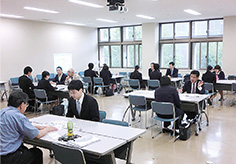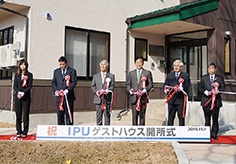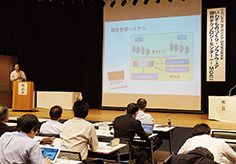- Implementation of the midterm plan and promotion of reconstruction efforts in Iwate
- Major Project Achievements for Academic Year 2015
In the 2015 Academic Year, which is the fifth year of the midterm of the phase two plan, we have worked toward achieving our mid-term goals, along with incorporating support operations of reconstruction in the disaster areas, into our academic year plan. Our school contributes in shaping regional talent into core workforce, as well as contributing in the regional revitalization. As such, we focused on the below pressure points. The entire university came together in the carrying out the reconstruction support operations.
① Acquisition of new students that have a strong sense of purpose and passion for learning
■ Our efforts in growing the applicant pool
The entire university came together to hold Preview Days where program information sessions and application advisement were held. In addition, we participated in college fairs as well as sending admissions officers to high schools. Each department ardently distributed information, and independently conducted high school visits, information sessions to discuss their programs, and application advisement as well.
■ Efforts in growing the student body of the graduate school
Each graduate program held academic advisement for students pursuing higher education, and admission information sessions. We have also taken steps in growing the student body by offering technical college students an opportunity to experience graduate school life.
■ Financial aid for students affected by the disaster
For students who were affected by the Great East Japan Earthquake and Tsunami, we continued to offer the reduction and exemption of tuition (206 students in total) and enrollment fee (19 students). We also provided student loans from “Disaster affected students special quota” of the academic incentive, and 9 students plus 2 graduate students received the incentive.
② Execution of a systematic and consistent education program
■ Advancing the reformation of Basic Education
To enrich the foundation courses, we have revisited the curricula and deliverables for the foreign language courses, physical education courses, and introductory seminars. We have improved the grading criteria and the degree map to push forward the reformation of our foundation courses.
■ Considering use of evaluation methods based on student learning outcomes
We took various steps to improve consistency of the learning outcomes from each course. For example, we have made the teaching methods and the grading criteria consistent in the English classes, and have achieved a more objective evaluation by incorporating TOEIC testing. In the nurse practitioner programs, we have implemented technical evaluation for graduating nursing students, and in the software and information programs, we have made adjustments to the faculty’s evaluation process.
■ Promotion of region-focused Education
In order to promote community-oriented education, we decided to offer a new academic minor, "Iwate Creation Education Program" and have decided to offer Regional Creation Education Program as an official course. In the Regional Creation Education Program, under the cooperation of 10 cities, towns and villages, 196 students learned the problems each area is currently facing.
■ Promote academic and student exchange with overseas universities
We conducted joint research and research exchange with educational research institutions overseas, including the United Kingdom, Austria and Korea. In addition, 63 students were sent to study abroad in countries such as China, Spain, and the United States. Furthermore, we have entered an agreement with two Indian Universities, Jawaharlal Nehru University and University of Engineering and Management. We have also advertised the use of guest houses, and translated our website and application guidelines into English, to grow our international student population.
③Supporting the development of student employability and promotion of employment within Iwate Prefecture
■ Confirmed the relevance between external examinations and the IPU-E map
We had every 1st and 2nd year students from all programs take the PROG test, which was introduced as a supplement to the IPU-E map. We examined the results, which confirmed that there is a significant relevance.
■ Expansion of internship opportunities through university collaboration
With the cooperation of the IPU Employment Supporters (companies that support the University’s efforts in developing the students’ employability by providing lecturers, internship opportunities and corporate tours), Iwate Prefectural University, Iwate University, and Morioka University participated in internships, marking a record high of 197 participants. From the 2016 Academic Year, our university has played a principal role in launching "internships in Tohoku" (a non-competitive internship placement system for students from 6 universities in Iwate, Yamagata, and Fukushima), and taking steps in providing students with work experience, encouraging graduates to stay in the Tohoku area.
 IPU guest house opening ceremonyMini joint job fair by local businesses
IPU guest house opening ceremonyMini joint job fair by local businesses
 IPU guest house opening ceremony
IPU guest house opening ceremony
■ Establishment of students within Iwate Prefecture
In order to promote student employment within Iwate Prefecture, job fairs as well as industry and corporate research seminars were held. We also hosted "Company visit bus tours" for faculty and staff, "Effective recruitment research" for career advisors, and we also held seminars and events such as "Know your local companies project" and "Joint job fair" for students, which had a great turnout.
■ Strengthening the measures for public service examination
We welcomed five of our recent alumni, now working as civil servants, to give lectures on civil service. We were able to address student requests and conducted mock-interviews and practice group discussions. As a result, 66 students received job offers in civil service, the highest number ever.
④ Carrying out research that is valuable to the region and publicly disclosing the results
■ Promotion of research into local challenges
We conducted Regional Creation Joint Research, on the newly implemented Regional Creation Support Team; In addition, we provided support to 10 cities, towns, and villages utilizing technical know-how. These local areas in Iwate Prefecture are formulating a comprehensive strategy as well as population prospects. In addition, we are promoting three research projects, and provided feedback on the evaluation results in support of the project management.
■ Promotion of research into local challenges
"Iwate Prefectural University Research Presentation" was held in September over 3 days, and a total of 132 research results were made public in a lectures and panel exhibitions, and the research of each program was published in academic journals and to the department websites. In addition, we were able to expand distribution of the research conducted by Iwate Monodukuri and Software Integration Technology Center (i-MOS) and the Regional Policy Research Center. Results were presented at various exhibitions and reports were distributed to businesses and local authorities.
■ Promoting acquisition of external funds
In order to encourage more applicants and help obtain Grant-in-Aid for Scientific Research, we have revised the system of offering our faculty help in refining their research planning and providing a commissioned advisor to give guidance. In addition, we actively publicized our research results through various exhibitions, trade shows etc., and provided faculty with information on competitive funds, and help finessing applications.
⑤ Strengthening the Collaboration between Industry, Academia and Government, and demonstrating the Thinktank Function.
■ Strengthening the cooperation with Takizawa City IPU Innovation Center
Resident companies of the Takizawa City IPU Innovation Center is in joint research with us, and our students were also provided internship opportunities. We also received cooperation in our classes, including PBL. Furthermore, we made progress in strengthening this cooperative relationship, such as creating a space within the Center for student entrepreneurs. With the goal of promoting collaboration between resident companies of the Center and faculty, we regularly held discussion sessions
■ Engineer training and product development at i-MOS
In addition to offering 20 courses for advanced technician training courses, we held six courses to train young engineers in 3D modeling technology. The "IWATE Innovation Area for Next Generation Mobility" is currently engaged in three research themes, and we are in the process of developing practical application of the research for businesses. Furthermore, we have commercialized four projects by March 2016, including: systematic teaching of the CAN in-vehicle network specifications, bike sensors used in training for competitive cycling, and application software for tourism.
■ Resolving issues faced by the region
Utilizing the technical strengths of each of the departments, we took steps to resolve various issues of the region in cooperation with the local government as well as the private sector.
■ Strengthening relationships with the local government to collaborate on regional reconstruction and creation
We placed the regional development support team within the Regional Policy Research Center to support policies attached to the comprehensive regional reconstruction strategy. We have sent faculty members to participate in local discussion groups; for the 13 cities, towns and villages, we showed support of promotion, research and analysis of a regional adaptation of the comprehensive policy strategy and population prospects.
⑥ Development of teaching staff who contribute to the realization of the ideals of university
■ New program that combines FD and SD
We conducted two new university-wide seminars, with the goal of enabling feedback to department-specific teaching methods, sharing current issues cross-departmentally among faculty and staff, as well as revising the FD (faculty development) and SD (staff development) seminars.
■ Planned and effective operation of academic sabbaticals
Two of our faculty members took academic sabbaticals (one domestic, one overseas) while we improved the handling of expenses stipulated in the outline, to encourage proper operation and management.
■ Support the career development of faculty members by Human Resources Development Vision and Planning
In our support of career development for our staff, we sent them to participate in external training, as well as providing internal training and opportunities for faculty and staff to network.
 Iwate Prefectural University research presentation
Iwate Prefectural University research presentation




